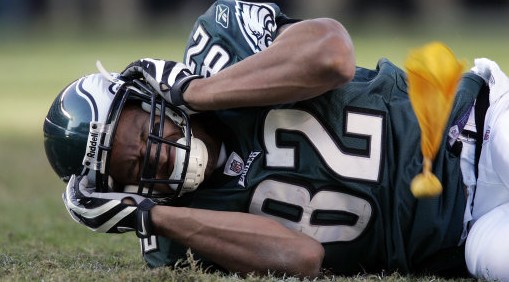On Friday, I received a forwarded email that was originally sent to a group of football players by a lawyer named Billy Conaty, who works for a multi-state law firm named Montgomery McCracken. Conaty introduced himself as a former NFL player, briefly described the pending concussion-based lawsuits pending against the NFL, and offered his phone and email in case the players desired more information. The email is embedded, below.
[Name redacted],
Hope you're doing well, this is Billy Conaty. Like you, I am a former NFL player. I played 9 seasons on the offensive line before becoming an attorney.
You may be aware that hundreds of former players are suing the NFL for allegedly covering up what it knew about the long-term affects of concussions. It is not necessary that a player suffered a diagnosed concussion to join the lawsuit. Players who have ever had any concussion like symptoms while playing such as a headache, dizziness, disorientation, getting your bell rung, seeing stars etc., qualify to join. Many players are now experiencing post-concussion symptoms such as headaches, anxiety, depression, short-term memory loss, sleeplessness, etc. and are looking to hold the NFL accountable for their role in the alleged cover up.
If you have any interest in joining this lawsuit please let me know and I can explain further. Please feel free to call me at [Phone # redacted], or please email me with the best number to reach you.
Thank you,
Billy Conaty
Upon receiving the email, I wondered aloud (on Twitter) as to whether the email, which appeared to clearly be a form of solicitation, was permissible. I was thinking back to my Professional Responsibility class and the endless number of Rules of Professional Conduct that were stamped into my brain. Specifically, the following Rule came to mind.
Information About Legal Services
Rule 7.3 Direct Contact With Prospective Clients
(a) A lawyer shall not by in-person, live telephone or real-time electronic contact solicit professional employment from a prospective client when a significant motive for the lawyer's doing so is the lawyer's pecuniary gain, unless the person contacted:
(1) is a lawyer; or
(2) has a family, close personal, or prior professional relationship with the lawyer.
(c) Every written, recorded or electronic communication from a lawyer soliciting professional employment from a prospective client known to be in need of legal services in a particular matter shall include the words "Advertising Material" on the outside envelope, if any, and at the beginning and ending of any recorded or electronic communication, unless the recipient of the communication is a person specified in paragraphs (a)(1) or (a)(2).
Regarding sub-section (a), the football players are not lawyers and likely have no family, “close personal,” or prior professional relationship with Conaty. Perhaps Conaty did not have a “significant motive” for “pecuniary gain,” however I am rather skeptical. Moving on to sub-section (c), Conaty certainly failed to include the phrase “Advertising Material” at the beginning or end of the correspondence that was forwarded to me. But sub-section (c) only applies if Conaty failed to adhere to sub-section (a).
After posting my comments on Twitter, others noted that their football clients received the same, or similar, messages from Conaty.


One reply on “Lawyer Solicits Football Players To Join Concussion Class Action”
I think it can be argued that email shouldn’t be considered real-time electronic contact. It is more like physical mail than say an online chat or texting. I do think that, if considered in that light, the email should include an “Advertising Material” label.